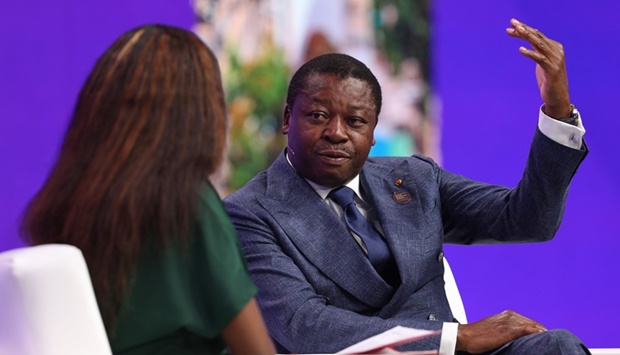Togo is taking steps to substitute key imports and reduce emergency spending aimed at curbing inflation, President Faure Gnassingbe said.
The government is spending $20mn a month to cap prices of basic goods such as wheat, corn and fuel in the $8.5bn economy, he said on Tuesday at the Qatar Economic Forum in Doha.
“That’s not sustainable for our finances so we are trying to set up a new strategy for the mid- and long-term,” the president said.
The state is planning to urge bakers to mix wheat with locally-grown cassava to cut the import bill, while drivers of petrol-fuelled motorbikes, the most widely used form of transportation, are also expected to gradually switch to electric vehicles.
The central bank of West African States, which raised its benchmark interest rate to 2.25% earlier this month, will likely increase it further after the inflation rate accelerated to 6%. The bank, also known as BCEAO, regulates the financial sector of the West African Economic and Monetary Union, made up of Togo and seven other countries which share a common currency, the West African CFA franc. It targets annual inflation at 3%.
Another issue facing the region is spreading insecurity, Gnassingbe said.
Terrorist violence is moving southward from Sahelian states such as Mali and Burkina Faso. Togo, which experienced a deadly attack in May, has declared a state of emergency in its northernmost Savanes region, which shares a border with Burkina Faso.
The violence is “impeding our efforts to attract investors” by raising the country’s risk profile, Gnassingbe said.
Qatar’s Ministry of Commerce and Industry, Qatar Investment Authority and Investment Promotion Agency Qatar are the underwriters of the Qatar Economic Forum, powered by Bloomberg.
The government is spending $20mn a month to cap prices of basic goods such as wheat, corn and fuel in the $8.5bn economy, he said on Tuesday at the Qatar Economic Forum in Doha.
“That’s not sustainable for our finances so we are trying to set up a new strategy for the mid- and long-term,” the president said.
The state is planning to urge bakers to mix wheat with locally-grown cassava to cut the import bill, while drivers of petrol-fuelled motorbikes, the most widely used form of transportation, are also expected to gradually switch to electric vehicles.
The central bank of West African States, which raised its benchmark interest rate to 2.25% earlier this month, will likely increase it further after the inflation rate accelerated to 6%. The bank, also known as BCEAO, regulates the financial sector of the West African Economic and Monetary Union, made up of Togo and seven other countries which share a common currency, the West African CFA franc. It targets annual inflation at 3%.
Another issue facing the region is spreading insecurity, Gnassingbe said.
Terrorist violence is moving southward from Sahelian states such as Mali and Burkina Faso. Togo, which experienced a deadly attack in May, has declared a state of emergency in its northernmost Savanes region, which shares a border with Burkina Faso.
The violence is “impeding our efforts to attract investors” by raising the country’s risk profile, Gnassingbe said.
Qatar’s Ministry of Commerce and Industry, Qatar Investment Authority and Investment Promotion Agency Qatar are the underwriters of the Qatar Economic Forum, powered by Bloomberg.

